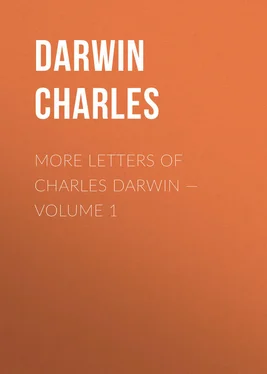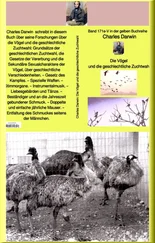Charles Darwin - More Letters of Charles Darwin — Volume 1
Здесь есть возможность читать онлайн «Charles Darwin - More Letters of Charles Darwin — Volume 1» — ознакомительный отрывок электронной книги совершенно бесплатно, а после прочтения отрывка купить полную версию. В некоторых случаях можно слушать аудио, скачать через торрент в формате fb2 и присутствует краткое содержание. Жанр: foreign_antique, foreign_prose, на английском языке. Описание произведения, (предисловие) а так же отзывы посетителей доступны на портале библиотеки ЛибКат.
- Название:More Letters of Charles Darwin — Volume 1
- Автор:
- Жанр:
- Год:неизвестен
- ISBN:нет данных
- Рейтинг книги:4 / 5. Голосов: 1
-
Избранное:Добавить в избранное
- Отзывы:
-
Ваша оценка:
- 80
- 1
- 2
- 3
- 4
- 5
More Letters of Charles Darwin — Volume 1: краткое содержание, описание и аннотация
Предлагаем к чтению аннотацию, описание, краткое содержание или предисловие (зависит от того, что написал сам автор книги «More Letters of Charles Darwin — Volume 1»). Если вы не нашли необходимую информацию о книге — напишите в комментариях, мы постараемся отыскать её.
More Letters of Charles Darwin — Volume 1 — читать онлайн ознакомительный отрывок
Ниже представлен текст книги, разбитый по страницам. Система сохранения места последней прочитанной страницы, позволяет с удобством читать онлайн бесплатно книгу «More Letters of Charles Darwin — Volume 1», без необходимости каждый раз заново искать на чём Вы остановились. Поставьте закладку, и сможете в любой момент перейти на страницу, на которой закончили чтение.
Интервал:
Закладка:
LETTER 58. TO T.H. HUXLEY. Down, September 26th {1857}.
Thanks for your very pleasant note. It amuses me to see what a bug-bear I have made myself to you; when having written some very pungent and good sentence it must be very disagreeable to have my face rise up like an ugly ghost. (58/1. This probably refers to Darwin's wish to moderate a certain pugnacity in Huxley.) I have always suspected Agassiz of superficiality and wretched reasoning powers; but I think such men do immense good in their way. See how he stirred up all Europe about glaciers. By the way, Lyell has been at the glaciers, or rather their effects, and seems to have done good work in testing and judging what others have done...
In regard to classification and all the endless disputes about the "Natural System," which no two authors define in the same way, I believe it ought, in accordance to my heterodox notions, to be simply genealogical. But as we have no written pedigrees you will, perhaps, say this will not help much; but I think it ultimately will, whenever heterodoxy becomes orthodoxy, for it will clear away an immense amount of rubbish about the value of characters, and will make the difference between analogy and homology clear. The time will come, I believe, though I shall not live to see it, when we shall have very fairly true genealogical trees of each great kingdom of Nature.
LETTER 59. TO T.H. HUXLEY. Down, December 16th {1857}.
In my opinion your Catalogue (59/1. It appears from a letter to Sir J.D. Hooker (December 25th, 1857) that the reference is to the proofs of Huxley's "Explanatory Preface to the Catalogue of the Palaeontological Collection in the Museum of Practical Geology," by T.H. Huxley and R. Etheridge, 1865. Mr. Huxley appends a note at page xlix: "It should be noted that these pages were written before the appearance of Mr. Darwin's book on 'The Origin of Species' — a work which has effected a revolution in biological speculation.") is simply the very best resume, by far, on the whole science of Natural History, which I have ever seen. I really have no criticisms: I agree with every word. Your metaphors and explanations strike me as admirable. In many parts it is curious how what you have written agrees with what I have been writing, only with the melancholy difference for me that you put everything in twice as striking a manner as I do. I append, more for the sake of showing that I have attended to the whole than for any other object, a few most trivial criticisms.
I was amused to meet with some of the arguments, which you advanced in talk with me, on classification; and it pleases me, {that} my long proses were so far not thrown away, as they led you to bring out here some good sentences. But on classification (59/2. This probably refers to Mr. Huxley's discussion on "Natural Classification," a subject hardly susceptible of fruitful treatment except from an evolutionary standpoint.) I am not quite sure that I yet wholly go with you, though I agree with every word you have here said. The whole, I repeat, in my opinion is admirable and excellent.
LETTER 60. TO J.D. HOOKER. Down, February 28th {1858}.
Hearty thanks for De Candolle received. I have put the big genera in hand. Also many thanks for your valuable remarks on the affinities of the species in great genera, which will be of much use to me in my chapter on classification. Your opinion is what I had expected from what little I knew, but I much wanted it confirmed, and many of your remarks were more or less new to me and all of value.
You give a poor picture of the philosophy of Botany. From my ignorance, I suppose, I can hardly persuade myself that things are quite as bad as you make them, — you might have been writing remarks on Ornithology! I shall meditate much on your remarks, which will also come in very useful when I write and consider my tables of big and small genera. I grieve for myself to say that Watson agrees with your view, but with much doubt. I gave him no guide what your opinion was. I have written to A. Gray and to X., who — i.e. the latter — on this point may be looked at as S. Smith's Foolometer.
I am now working several of the large local Floras, with leaving out altogether all the smallest genera. When I have done this, and seen what the sections of the largest genera say, and seen what the results are of range and commonness of varying species, I must come to some definite conclusion whether or not entirely to give up the ghost. I shall then show how my theory points, how the facts stand, then state the nature of your grievous assault and yield entirely or defend the case as far as I can honestly.
Again I thank you for your invaluable assistance. I have not felt the blow {Hooker's criticisms} so much of late, as I have been beyond measure interested on the constructive instinct of the hive-bee. Adios, you terrible worrier of poor theorists!
LETTER 61. TO J.D. HOOKER. Down {1858?}
Many thanks for Ledebour and still more for your letter, with its admirable resume of all your objections. It is really most kind of you to take so very much trouble about what seems to you, and probably is, mere vagaries.
I will earnestly try and be cautious. I will write out my tables and conclusion, and (when well copied out) I hope you will be so kind as to read it. I will then put it by and after some months look at it with fresh eyes. I will briefly work in all your objections and Watson's. I labour under a great difficulty from feeling sure that, with what very little systematic work I have done, small genera were more interesting and therefore more attracted my attention.
One of your remarks I do not see the bearing of under your point of view — namely, that in monotypic genera "the variation and variability" are "much more frequently noticed" than in polytypic genera. I hardly like to ask, but this is the only one of your arguments of which I do not see the bearing; and I certainly should be very glad to know. I believe I am the slowest (perhaps the worst) thinker in England; and I now consequently fully admit the full hostility of Urticaceae, which I will give in my tables.
I will make no remarks on your objections, as I do hope you will read my MS., which will not cost you much trouble when fairly copied out. From my own experience, I hardly believe that the most sagacious observers, without counting, could have predicted whether there were more or fewer recorded varieties in large or small genera; for I found, when actually making the list, that I could never strike a balance in my mind, — a good many varieties occurring together, in small or in large genera, always threw me off the balance...
P.S. — I have just thought that your remark about the much variation of monotypic genera was to show me that even in these, the smallest genera, there was much variability. If this be so, then do not answer; and I will so understand it.
LETTER 62. TO J.D. HOOKER. February 23rd {1858}.
Will you think of some of the largest genera with which you are well acquainted, and then suppose 4/5 of the species utterly destroyed and unknown in the sections (as it were) as much as possible in the centre of such great genera. Then would the remaining 1/5 of the species, forming a few sections, be, according to the general practice of average good Botanists, ranked as distinct genera? Of course they would in that case be closely related genera. The question, in fact, is, are all the species in a gigantic genus kept together in that genus, because they are really so very closely similar as to be inseparable? or is it because no chasms or boundaries can be drawn separating the many species? The question might have been put for Orders.
LETTER 63. TO J.D. HOOKER. Down, February 9th {1858}.
I should be very much obliged for your opinion on the enclosed. You may remember in the three first volumes tabulated, all orders went right except Labiatae. By the way, if by any extraordinary chance you have not thrown away the scrap of paper with former results, I wish you would return it, for I have lost my copy, and I shall have all the division to do again; but DO NOT hunt for it, for in any case I should have gone over the calculation again.
Читать дальшеИнтервал:
Закладка:
Похожие книги на «More Letters of Charles Darwin — Volume 1»
Представляем Вашему вниманию похожие книги на «More Letters of Charles Darwin — Volume 1» списком для выбора. Мы отобрали схожую по названию и смыслу литературу в надежде предоставить читателям больше вариантов отыскать новые, интересные, ещё непрочитанные произведения.
Обсуждение, отзывы о книге «More Letters of Charles Darwin — Volume 1» и просто собственные мнения читателей. Оставьте ваши комментарии, напишите, что Вы думаете о произведении, его смысле или главных героях. Укажите что конкретно понравилось, а что нет, и почему Вы так считаете.












